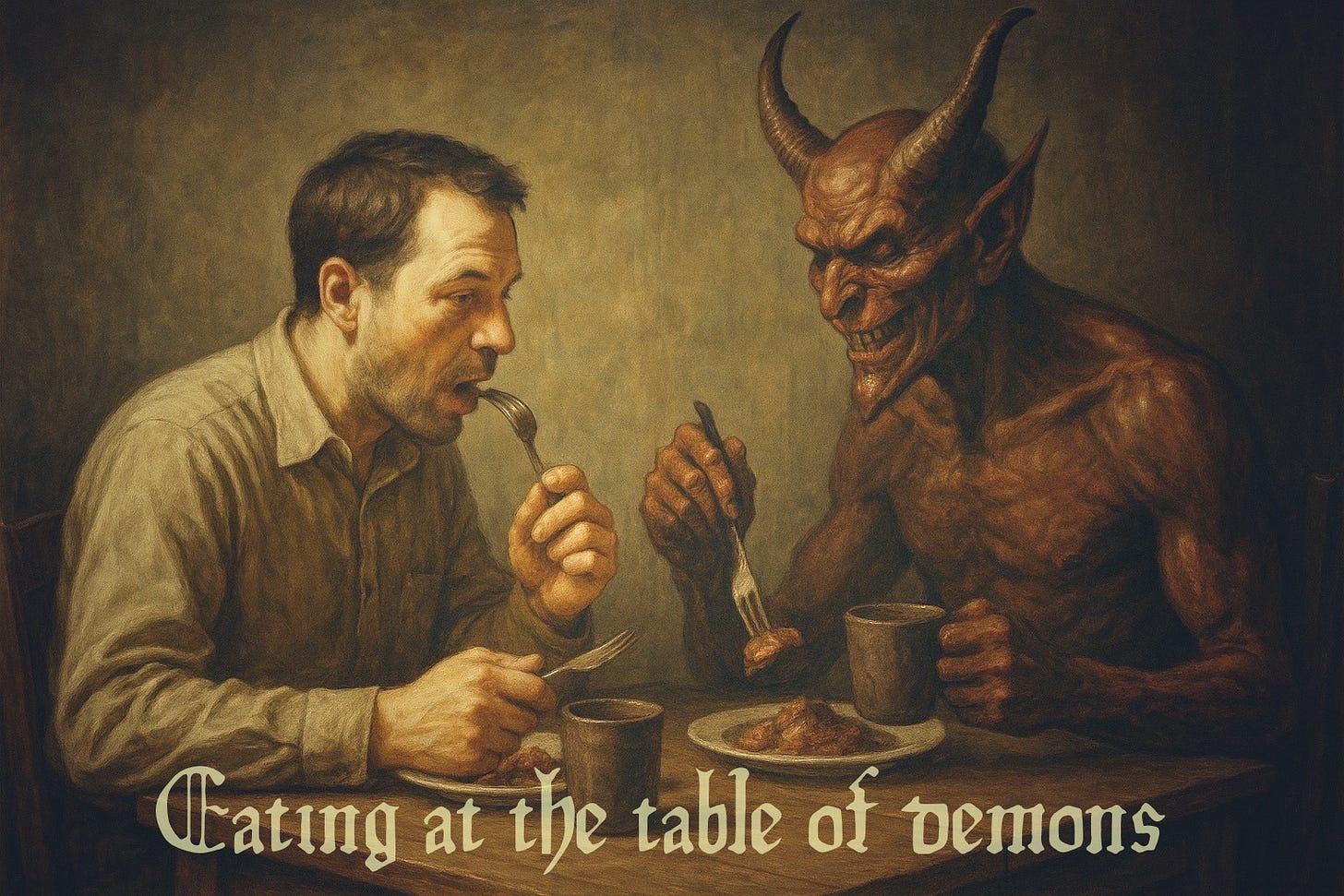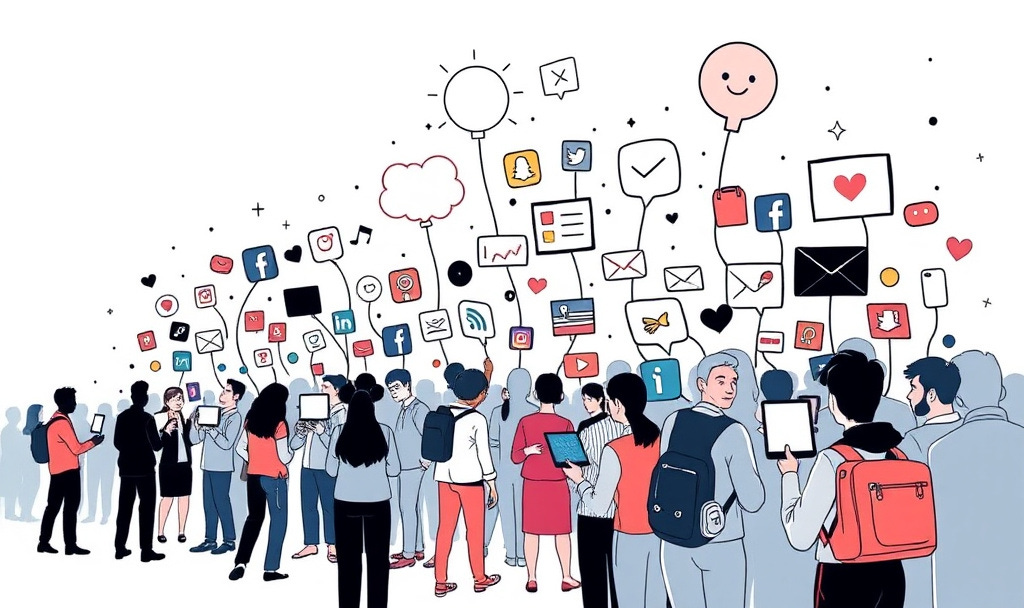Thinking About Social Media Feeds
do we feed the algorithm or or does the algorithm feed us?
Thinking of social media, why do we call it a feed? The word feed means to supply with material or power. What, exactly, does my Xwitter Feed feed me? What do we feed others through our participation in the Xwitter feed phenomenon? What kind of meal plan has the algorithm drawn up for those who dine at the Xwitter table? What energy do we give to the unseen forces of evil1 (ie in the form of the algorithm) at work on Xwitter through our consumption choices?
Evil seeks to dehumanise, break nature, frustrate grace; it represents the ultimate end of purposelessness. Can we always describe evil as malicious? When do we acknowledge the banality of evil?
Last week, Father Kenneth Tanner taught 1 Corinthians 10 at the Open Table Conference (OTC). In a memorable part of the chapter, Paul speaks of eating at the table of demons. I felt so engaged by Fr. Tanner’s lecture on 1 Corinthians 10 that I wrote a short reflection about it.
During that OTC panel discussion from last week, Chris EW Green talked about our modern day secular culture and the ways in which, through that culture, we participate with demons2. He talked about how we consume in ways that energise the demonic force. He used social media as an example. Chris reiterated that thought train in a podcast he recorded just after last week’s OTC session.
We can feel the tension and hostility which polarisation exudes, and we can see political upheaval playing out in our society. We observe what Samuel Huntington called a society torn apart—hierarchical, repressive, and dangerously divided, to the point where “…the majority of the population [exists] outside the mainstream,” to quote Stuart Parker’s description of Huntington. In his book Clash of Civilisations, Huntington argued that “… culture and cultural identities, which at the broadest level are civilization identities, are shaping the patterns of cohesion, disintegration, and conflict in the post-Cold War world” (Huntington 1996, p. 20). Huntington wrote that, whilst “… cultural commonality facilitate(s) cooperation and cohesion among people … cultural differences promote cleavages and conflicts,” (Huntington 1996, p. 128).
How has social media transformed our self perception, both on an individual and collective basis? How has social media influenced our perception of each other? How does our perception of our fellow humans become altered by consuming information on Xwitter? Just a few minutes on Xwitter has the effect of profoundly altering of my perceptions of humans, on a political identity basis. A mind which feeds itself on Xwitter comes to perceive both enemies and allies in a different spirit.
How does all this impact our discourse? How does it carve out our political terrain? Huntington wrote about the impact on societies and nation states of political identities and their cultures. He didn’t write about social media, in 1996 that didn’t feature prominently in anyone’s political analysis. However, in the 20 years since Clash of Civilisations came out, we have seen an ominous evolution in our consumption behaviours. In particular, we see the impact of political identities and their cultural trappings on our consumption behaviour. We have also seen the way algorithms driving our consumption behaviour shape these political identities and their cultural trappings.
We have all experienced how our consumption behaviour feeds and empowers demons. We have seen the role social media plays. At this point, we can’t think of it as a neutral power, can we? Consider what feeds our consumption behaviour on social media—algorithms. Think of what our consumption behaviours feed—algorithms. Humans design and program algorithms to influence other humans. Do we consider forces of destruction at play and the ways they put at us at risk? Think about the fact that we have this thing called a social media feed. On what are we feeding when we consume social media content? It tastes like poison, doesn’t it? Algorithms boosts outage and fear, they exert unconscious influence over us.
It’s a kind of pseudo agency at play, when it comes to algorithms. When we feed on the rage-baiting and fear-mongering information on Xwitter, we boost that toxicity far and wide. Do we consider how this harms vulnerable and weak people? Do we consider the ways we enable evil and create energy for evil through the ways we feed on information via social media? How do we energise the thing we think we are opposing? Thinking too much of evil. Thinking too little of evil. In both cases, we end up energising evil, enslaving ourselves in sin. Do the sins we commit work against others? Do sins others commit work against us? Social media provides the opportunity for a convergence of some of the most poisonous political ideologies and cultural forces into frightening and dystopian identities that have taken on a demonic life our their own.
Do we consider the actual cost of “at any cost” approaches to opposing the perceived evils we have drawn ourselves up and into fighting? They invite the demonic. Through at any cost strategies, we become acolytes of death. In Creation and Fall; Temptation: Two Biblical Studies, Bonhoeffer wrote about the fact that the devil draws man away the word of G-d by making us forget G-d. The devil doesn’t need to fill us with hate, he can simply fill us with forgetfulness of goodness and love—that’s sufficient to causes us to verge off of the narrow path of G-d.
How can we guard our hearts and minds from this demonic force that operates beneath the level of our everyday awareness? We can follow the example of William Stringfellow. We can listen to issues at the ground level. We can consider the following questions for self assessment, to gauge our self awareness.
How do we encounter the issues in real time and life? How do we encounter death? How do we see power wield its impact upon others? How do we tap into the visceral level of perceptual awareness? How has the human body has become a loci for spiritual conflict? What do we observe about our own sense of desire? How does it commingle with that of others?
Remember, reader, to see humans as mimetic creatures.
How does social media affect how you view your enemies, your capacity to love your neighbours, the attention span you give your spouse and others around you in meatspace? Ignoring these visceral effects of social media gives death an opening to act upon your body in an insidious way that’s below your level of awareness. Can we go slow, staying close to the ground? Can we resist the urge to get swept up in the fast discourses swirling around us? Can we pay attention to the smaller things? How is the discourse being transformed away from paying attention to ordinary things to being ratcheted up into abstractions? How has ideology crept into the discourse?
What if we stayed grounded in the pedestrian? We could engage the slow and small. The fast and high invite demonic energies, we would do well to resist their allure and avoid them altogether. What if we could think scripturally? This means thinking biblically, not just imaging proof texts, rather, it means letting the scriptures infuse our imagination. Wouldn’t this provide a beginning point for an ethic to guide Christians? How can we cleave to freedom and obedience, instead of death? For one, we could make money a sacrifice or a sacrament. We could subvert our thirst for self indulgence. Think about and observe the imposters of G-d that surround you. What if you made an inquiry into your favourite idols? What would you discover about yourself? What does your social media feed reveal about what idols you worship?
References
Holy Bible, New Revised Standard Version Catholic Edition. (1989). Bible Gateway. https://www.biblegateway.com/versions/New-Revised-Standard-Version-Anglicised-Catholic-Edition-NRSVACE-Bible/#booklist
Samuel Huntington. (1996). The Clash of Civilizations and the Remaking of World Order. Simon and Shuster. https://msuweb.montclair.edu/~lebelp/1993SamuelPHuntingtonTheClashOfCivilizationsAndTheRemakingofWorldOrder.pdf
We can define evil as a powerful force that causes bad and wicked things to happen. We can define wicked as something that is very bad and deliberately harmful (to people). Therefore our definition of evil becomes a powerful force that causes bad and deliberately harmful things to happen.
We can define demon as an evil and destructive spirit believed to possess and torment.








